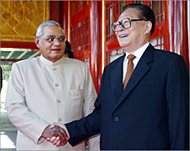India, China to hold naval exercise
Indian Prime Minister Atal Behari Vajpayee ended his six-day visit to China on Friday amid an announcement that the world’s two most populous countries would hold joint naval exercises this year-end.
 |
| Vajpayee (L) with Jiang Zemin, former Chinese president: Bid to build trust |
Vajpayee’s China visit, the first by a top-ranking Indian leader in a decade, was aimed at strengthening ties and bolstering bilateral trade between the two countries.
“I came here to strengthen India-China ties and to build trust,” Vajpayee told a news conference.
“I believe that in the last few days we have taken steps in the right direction,” he said.
As the Indian Prime Minister ended his trip, Indian Naval chief John Desilva said India and China would hold joint naval exercises later this year to cement ties further.
Under the plan, a three-day search and rescue exercise involving frontline warships would be held. Having once gone to war against each other, it would be the first joint operation in recent times.
India and China engaged in a short-lived war in 1962 over their unsettled border, which continues to be the main irritant between the two neighbours.
Relations between the two states worsened when India conducted nuclear tests in 1998, saying it was aimed at countering the threat from nuclear-armed China.
Stand on Tibet
Vajpayee also denied that a joint declaration he signed in Beijing would lead to a change of policy by New Delhi on the issue of whether Tibet is part of the sovereign territory of China.
“I would like to state that there is no ambiguity or inconsistency in our position in the joint declaration,” Vajpayee said.
A Tibetan government has sought sanctuary in India following a failed uprising against Chinese rule in 1959.
India’s stand on Tibet was that it recognised China’s suzerainty and not its sovereignty over the Himalayan state.